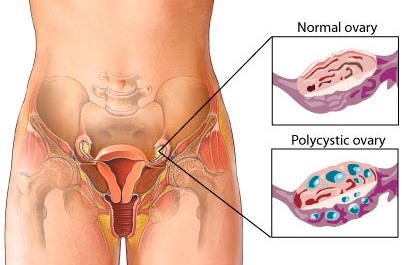Polycystic Ovary Syndrome or PCOS is common hormonal disorder among women of reproductive age. It usually appears in the ovaries with the disorder characterized by enlarged ovaries in addition to numerous small cysts located on each ovary. The condition is also characterized by irregular or absent periods, acne, obesity, and excess hair growth. Women with PCOS have a greater risk of obesity, diabetes, high blood pressure, and heart disease. PCOS occurs in 1 out of 10 pre-menopausal women and causes infertility in women. A woman that has PCOS may not know that she has it until she wants to try to conceive. At this time the symptoms, along with infertility will occur.

Polycystic Ovary Syndrome, image : womenshealth.gov
The Causes Of Polycystic Ovary Syndrome (PCOS)
It’s relate to an imbalance of hormones during the ovulation process. In the case of a healthy ovary an immature egg starts to develop each month. When it is mature it is released from the ovary. This process is known as ovulation. It is assisted by two vital hormones that are released by the pituitary gland. These are luteinizing hormone (LH) and follicle stimulating hormone (FSH). In the case of women who suffer with PCOS, the LH and FSH hormones are not released in the correct balance. This results in an inability of the developing egg to reach maturity. The ovary is, therefore, unable to release the egg. The follicle which houses the imperfectly formed egg then fills with fluid and becomes a cyst. Each month a new cyst will form. Over time the ovaries will become covered and enlarged with these cysts.
Researchers have been unable to fully determine the causes of PCOS. The condition appears to be genetic and sufferers have in common that they produce an unnatural level of male hormones in the ovaries and suffer from insulin resistance. A diagnosis of PCOS will include taking a full medical history of the patient, a pelvic examination to determine the level of enlargement of the ovaries, blood tests to determine LH and FSH hormone levels and ultrasound to scan for ovarian cysts.
Polycystic Ovary Syndrome Cure and Symptoms
PCOS has no cure but symptoms can be managed. Medications will be diagnosed by a medical professional. It is also advisable the sufferers of PCOS make changes to their diet in order to better manage their symptoms. An eating plan for PCOS should focus on lowering insulin levels and improving the body’s sensitivity to insulin. Processed grain foods found in white bread and flaked breakfast cereals should be replaced with high fiber low-GI versions. Saturated fat intake should be lowered by choosing lean meat cuts, skinless chicken and low fat dairy products. Half of one’s dinner plate should be filled with a variety of different colored vegetables and salads.
Exercise has also been proven to have a positive impact on the control of symptoms. Resistance weight training will help to improve blood glucose and insulin levels. Walking for 30-40 minutes every other day will also help to control the symptoms of Polycystic Ovary Syndrome. See also PCOS at Wikipedia here.
Related post :
1. Ovarian Cyst
2. Ashermans Syndrome



 Saving...
Saving...